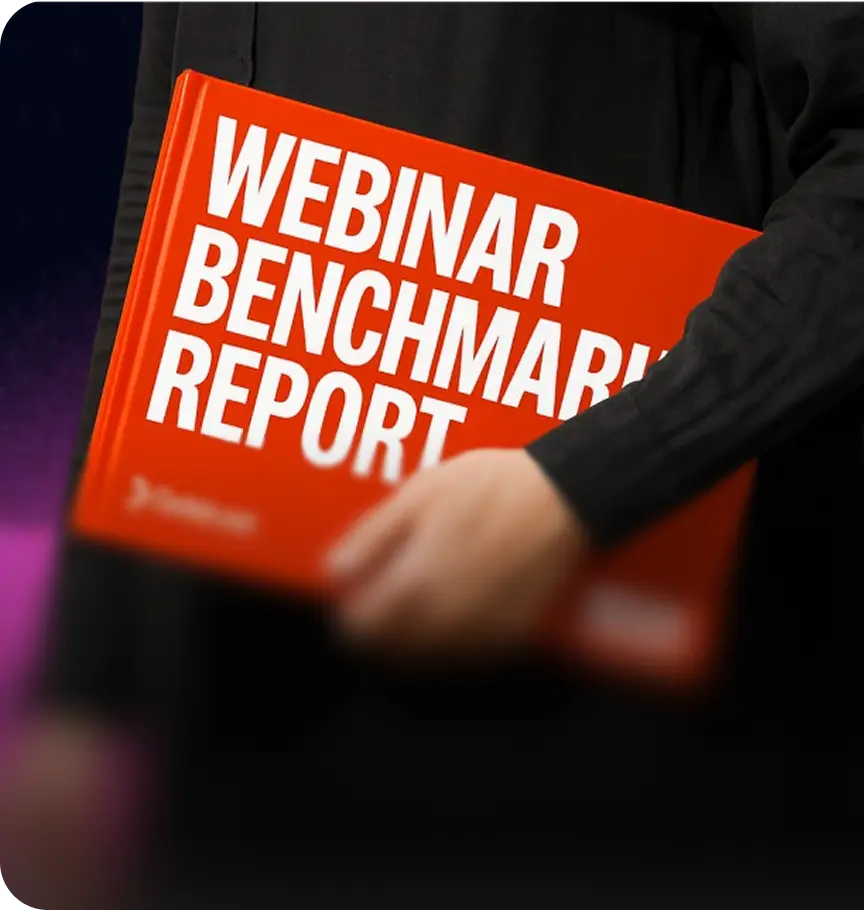9 Must-Have Event Marketing Tools to Streamline Your Event Operations

Table of Contents
Maximize Your Marketing ROI
Join 10,000 other marketers already getting the best tips on running engaging events that boost pipeline and create raving fans.
Event marketing is a crucial piece of every company's marketing programming.
In fact, for the corporate gifting leaders at Alyce, it clocks in as their second-highest pipeline generating channel.💥
But hosting an incredible event doesn’t just happen overnight. It takes a ton of prep and one rockstar event marketing manager to pull it all together.
To keep it as streamlined and scalable as possible, even the most experienced event marketers will have an arsenal of tools at their disposal to power their event teams and keep chaos to a minimum. And this goes well beyond having an engaging and reliable event management platform.
We've rounded up the top event marketing tools we keep hearing about from top-notch event marketers and mined dozens of reviews from real users to present an objective view of the potential pros and cons of each.
If you’re ready to find the best event marketing tools for your unique goals and strategy, we’ve got you covered.
Event marketing tools
- Marketing automation platforms (MAPs)
- Customer relationship management tools (CRMs)
- Social media management tools
- Project management tools
- Communication and collaboration platforms
- Gifting platforms
- Integration management and automation tools
- Design tools
- Analytics platforms
💡 Join Event Marketers Live for more tips, tools, and proven tactics from today’s leading event marketing minds.
1. Marketing automation platforms (MAPs) - Streamline event promotion and tracking
From email marketing, social media, paid advertisements, and beyond — navigating how to promote your event can be a struggle for even the savviest marketers. That’s where marketing automation platforms come in to help keep it all together. Instead of managing, tracking, and reporting on each campaign manually, MAPs streamline the process from start to finish.
Let’s take a closer look at some of the best MAPs for event marketers.
The inside scoop on this tool: Owning 41.6% of the small business automation software market, it’s safe to say HubSpot is a clear front-runner in the MAP market — especially for the busy event marketer wanting to keep as much as possible under one platform.
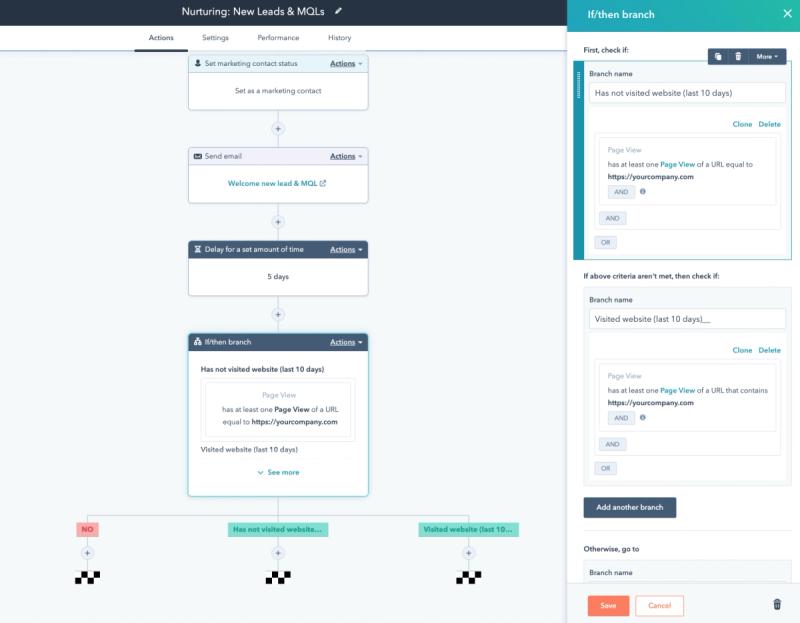
Source: Hubspot
✅ The pros:
- Easy to use
- Offers a free trial
- Access to a broad help center library
- Provides insights for data-driven event marketing decisions
❌ The cons:
- Minimum 12-month subscription
- A/B testing data only available on $2.4K+ plans
- Technical support comes at a premium
The inside scoop on this tool: As a MAP for medium-to-enterprise level businesses, Marketo is all about increasing customer insights, conversions and sales through personalized and automated campaigns. This is a great tool for the attendee-centric event marketers out there looking to track deeper insights across the customer journey.
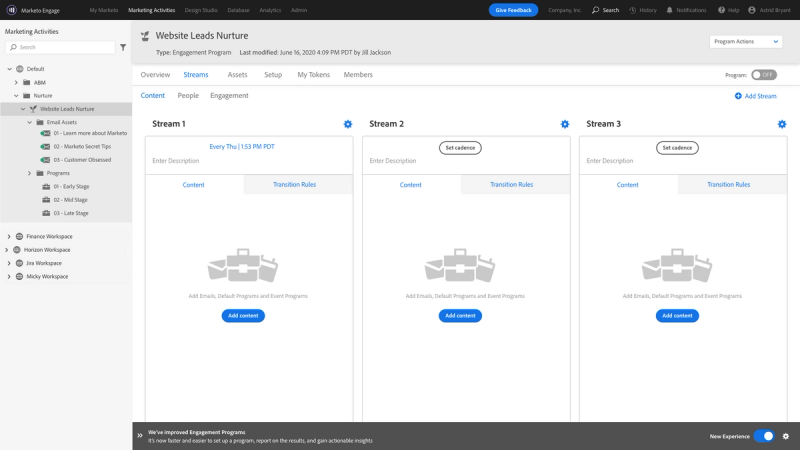
Source: Adobe
✅ The pros:
- A simple and intuitive platform
- Seamless Salesforce integration
- A+ customer service with an avid community of users
❌ The cons:
- Not as user-friendly as some of the more beginner level tools
- Analytics and reporting functionalities can be limited for certain event metrics
- Premium price tag
The inside scoop on this tool: Pardot (now called ‘Marketing Cloud Account Engagement’) is the go-to choice for Salesforce users, catering to users across small, medium and enterprise level organizations. Honing in on engagement history, scoring, multi-channel marketing and more, Pardot helps event marketers unlock the power of events for sales enablement across the customer journey.
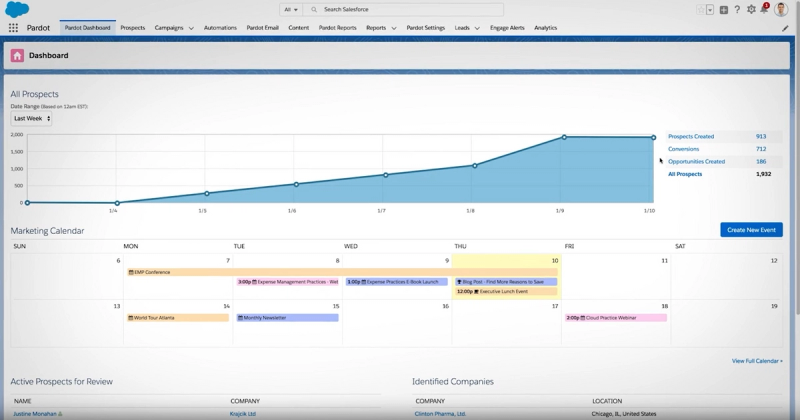
Source: Salesforce
✅ The pros:
- Real-time updates on customer and prospect activity
- Slick Salesforce integration
- A highly praised support team
- Can be customized to meet your needs
❌ The cons:
- Fewer third-party integrations compared to some competitors
- Data insights come at a premium — API and A/B testing are reserved for premium plans
👋🏻 Hey, there! Did you know Goldcast seamlessly integrates with your favorite MAPs? Learn more about how to instantly get all your key attendee insights right where you need them.
2. Customer relationship management tools (CRMs) - Tracking attendee engagement across the funnel
A true must-have for any modern MarTech stack, CRM software allows event marketers to manage every customer, prospect, and attendee relationship via a streamlined system that tracks interactions, engagement, sales, and more.
The inside scoop on this tool: Billing itself as the marketing platform that has everything companies need to grow, HubSpot graces our list again as a user-friendly CRM that brings all your customer and team activity data together under one roof.
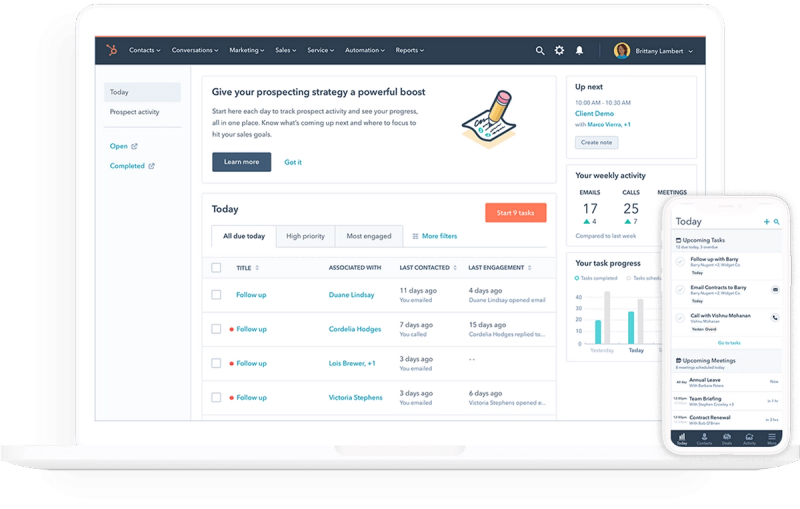
Source: Hubspot
✅ The pros:
- Substantial app marketplace to connect third-party tools
- Hubspot Academy with hundreds of email templates and other resources
- Can start for free and grow your subscription as needed
❌ The cons:
- Can be expensive to upgrade
- There are certain customization limits depending on the plan
The inside scoop on this tool: An official unicorn startup, Pipedrive is a CRM solution that operates in 175 different countries and is used by over 95,000 companies. Clearly a popular tool worldwide, Pipedrive can help event marketers keep attendee communication streamlined while tracking each account’s impact on pipeline.
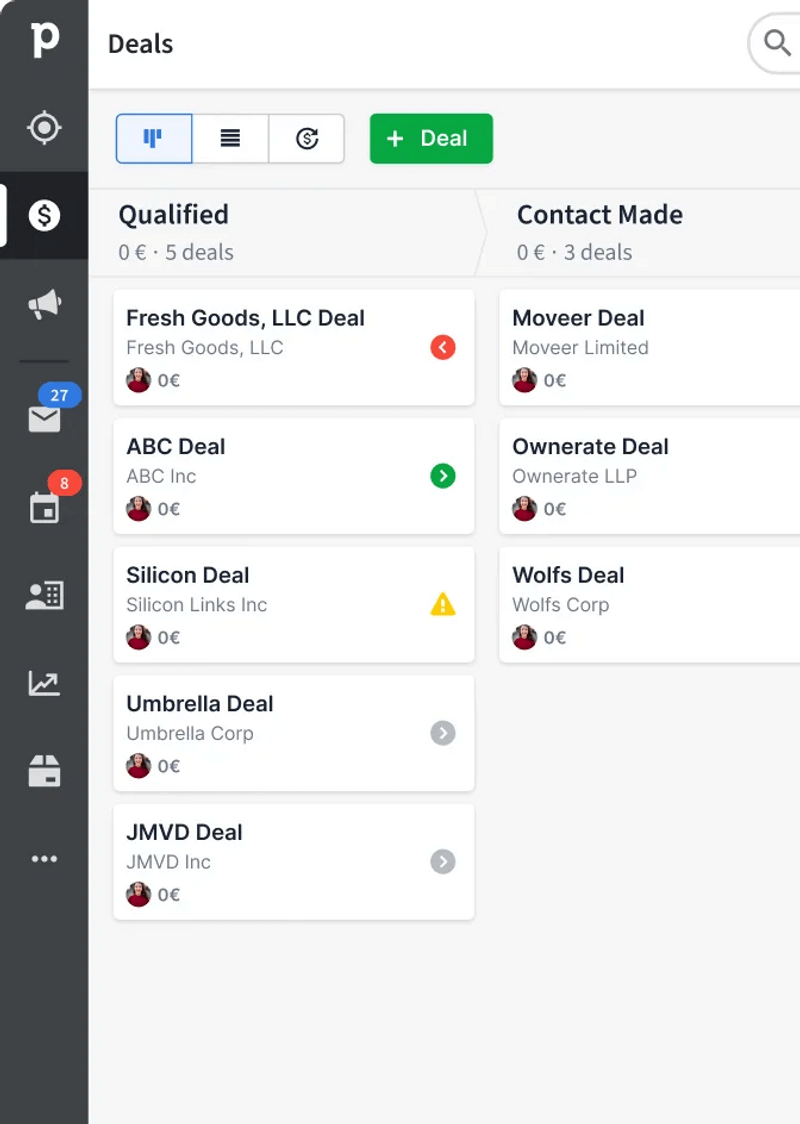
Source: Pipedrive
✅ The pros:
- User-friendly
- Affordable for many budgets
- 24/7 support regardless of plan
❌ The cons:
- Two-way data syncing can increase cost
- No free plans (but you can always opt for a trial)
The inside scoop on this tool: For the past 20 years, Salesforce has dominated the CRM industry for large and fast-scaling organizations, offering bespoke solutions to event marketers with growing and complex data requirements.
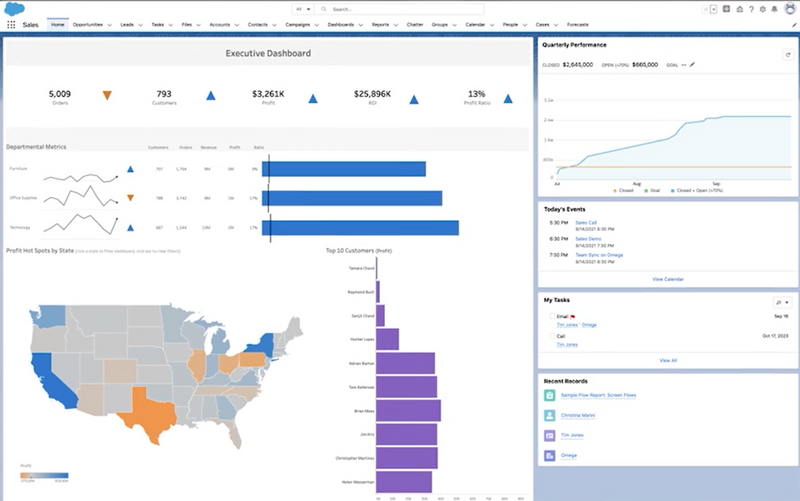
Source: Salesforce
✅ The pros:
- Advanced customization options
- Extensive reporting with account-level data for personalized event follow-ups
- Over 1,000 third party application integrations
❌ The cons:
- Premium price tag
- Customization options can feel complicated for new users
- Maintenance and retraining may be required
📈 Are your post event follow-ups performing like they should? Find out exactly what to say with our free Playbook on How to Use Virtual Event Data for Better Sales Follow-ups.
3. Social media management tools - Get maximum exposure for your events
Event marketing managers have a million things to do on the daily. Fortunately, an automated social media tool can help pick up the slack. The following event marketing tools are great for helping event managers prep and schedule social media posts in advance so they can get right back to planning.
The inside scoop on this tool: From creating content to scheduling event day posts and monitoring interaction — as the world’s first social media management platform, Hootsuite pretty much has it all.
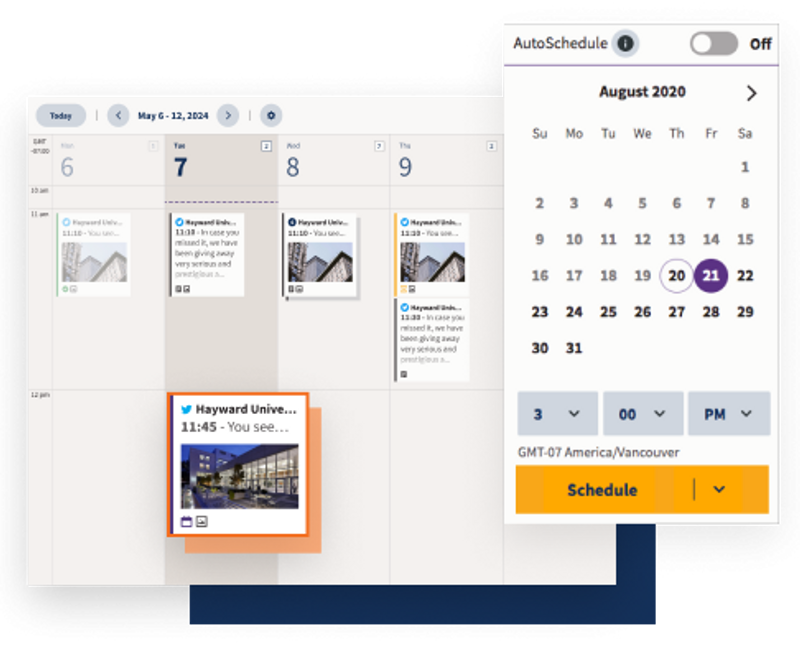
Source: Hootsuite
✅ The pros:
- Covers most social media networks
- Post to and monitor multiple social channels simultaneously
- A multitude of apps available to sync with
- Low pricing
❌ The cons:
- The auto-scheduling feature can be tricky to master
- App integration comes at an additional cost
- Additional training requires extra cost
The inside scoop on this tool: Measure your performance, curate campaigns, respond to your community and build your brand with a social media marketing tool built for growing businesses.
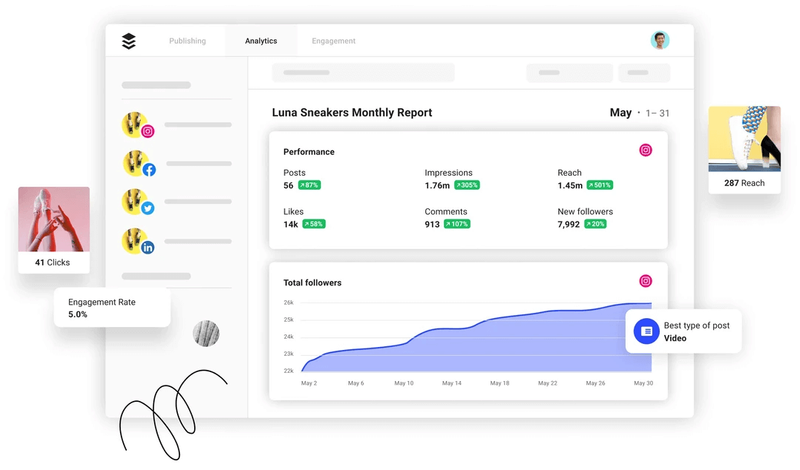
Source: Buffer
✅ The pros:
- Super simple to use
- Easy and intuitive to publish and schedule posts
- Free version available
❌ The cons:
- Limits to the real-time event data and social listening tools
- No phone or live chat support
- Prices can increase if multiple subscriptions are required
The inside scoop on this tool: A popular essential for event marketing pros who are keen to schedule event promo content in advance and assess hashtag and post interaction data in real time during the event.
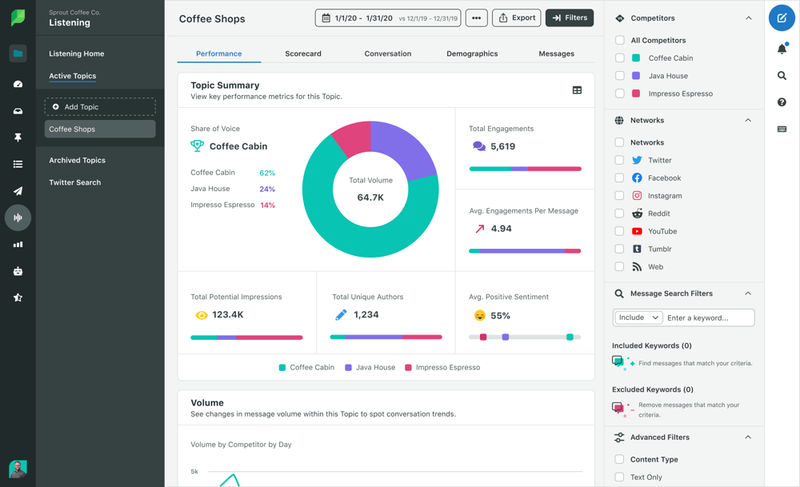
Source: Sprout Social
✅ The pros:
- Excellent UX makes it easy to pull social media event data
- Staging and publishing content is a breeze
❌ The cons:
- As with other tools, scheduling posts across platforms can get tricky
- Social listening tools not available on basic plans
4. Project management tools - Hit every event planning milestone
Keeping track of an event goes far beyond a simple checklist. From managing speakers, creating event content, and planning attendee follow-up — a dynamic project management tool is a must for every modern event marketer.
The inside scoop on this tool: Trello is a longstanding player in the project management space, with a sharp focus on usability, accessibility, and affordability, which is reflected in its one-of-a-kind Kanban style approach to task management.
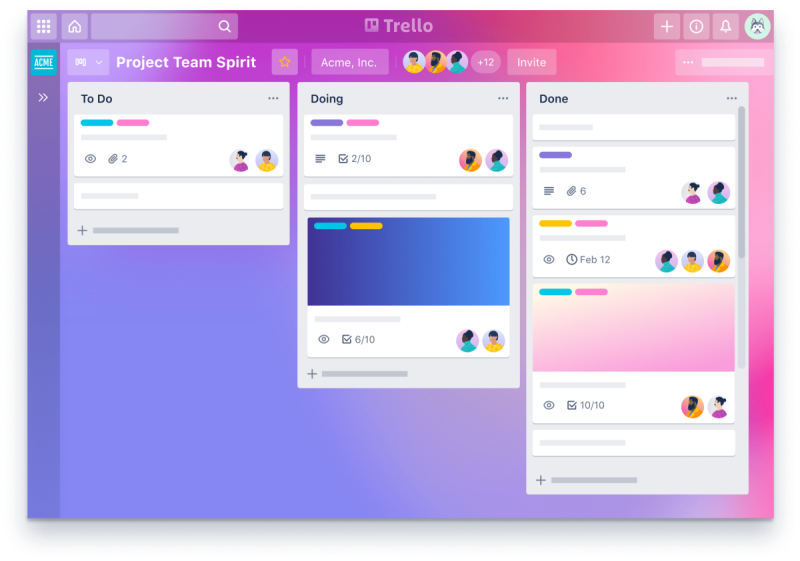
Source: Trello
✅ The pros:
- Easy to understand even for beginners
- Allows for simplistic automation, even on the free plan
- Plenty of third-party customizations and upgrades available through Power-Ups
- Well-optimized mobile app
❌ The cons:
- Can get complicated with an increase in projects or users
- No reporting features
The inside scoop on this tool: Basecamp is a project management tool that keeps event organization simple. With easy-to-navigate projects and to-dos, it’s a great tool for event marketers in the startup, scale-up, and small business category.
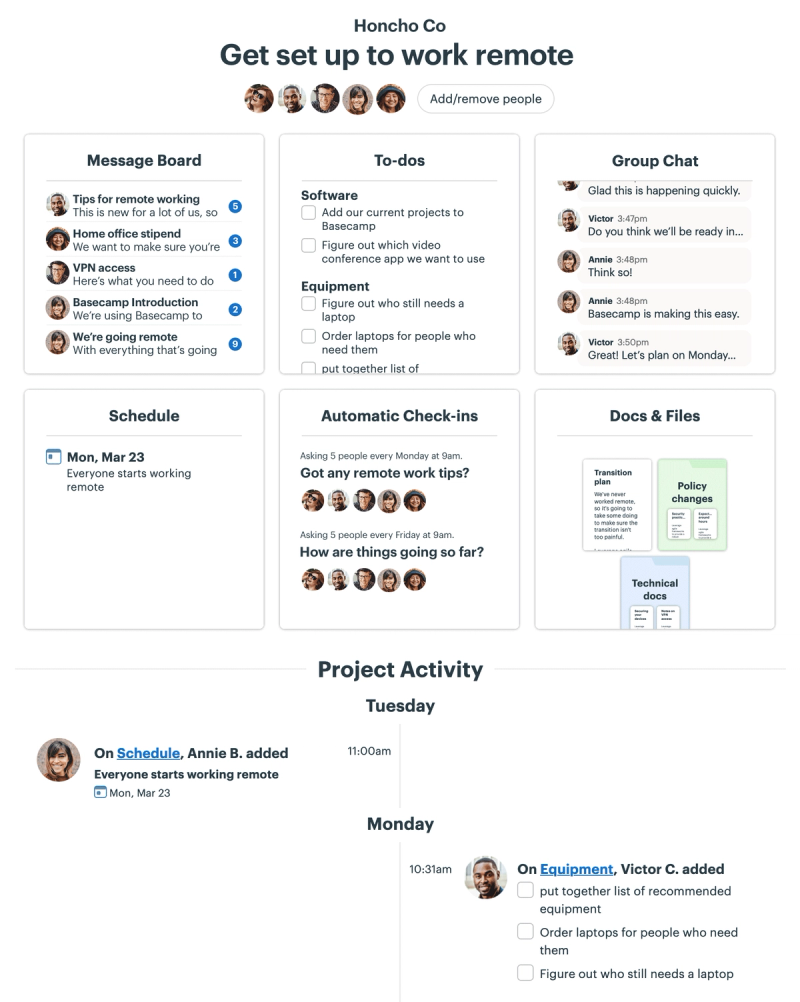
Source: Basecamp
✅ The pros:
- Best in class for basic projects
- Robust search functionality
- Offers extra communication functionality via Campfires
- Free trial available
❌ The cons:
- Limited project views and tracking
- No task prioritization, custom statuses, or comment assigning
- Premium plans can get pricey
The inside scoop on this tool: If speed and efficiency are what you’re after, Asana’s focus on creating a collaborative, customized and easy-on-the-eyes platform is just what you’re looking for.
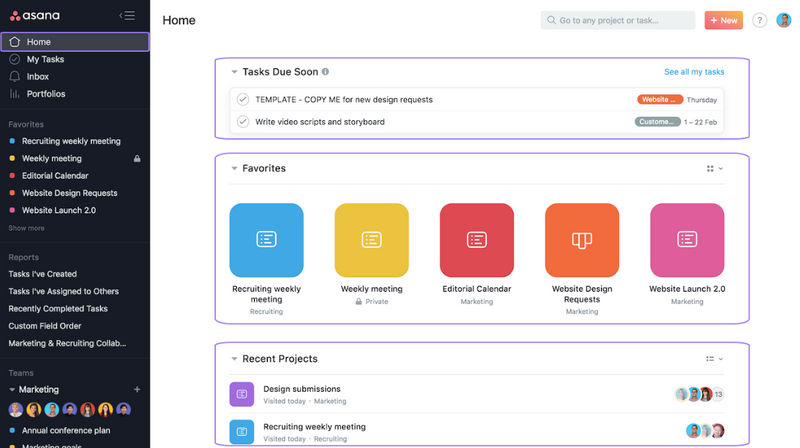
Source: Asana
✅ The pros:
- Rule-based automation allows event marketers to progress, speed up, and replicate tasks
- Dynamic dashboards, charts, and graphs for real-time reporting
- Advanced customization options
- Over 100 integrations available
- Free plans available
❌ The cons:
- Can be overwhelming for new users
- Exporting functionality is limited
5. Communication and collaboration platforms - Keep your entire event team on the same page
With speakers, moderators, customers (and so many more!) in the mix, a platform that allows for seamless communication is a crucial tool for every event team. Look for a platform with features like 1:1 and 1:many phone and video calling, task management, team and direct messaging, file-sharing, and more.
The inside scoop on this tool: Slack is a go-to communication and collaboration hub that brings people, information, and tools together to create ultimate efficiency.
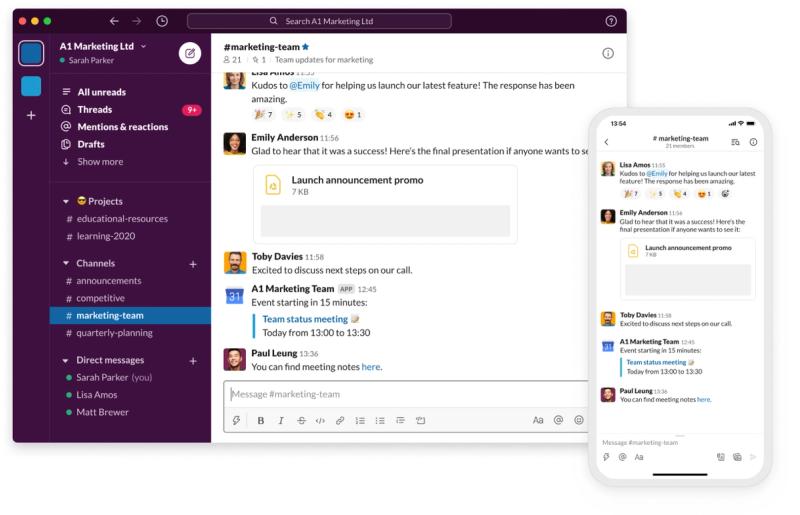
Source: Slack
✅ The pros:
- An unbeatable user interface
- Simple and speedy to start conversations — an essential for those on-the-day event emergencies
- Smart search functionality for those last-minute lookups
- Significant app and integration options
- Automation available for popular workflows
❌ The cons:
- It can be intrusive — constant pings during an event can be distracting
- If threads aren’t used correctly, conversations can become disorganized
The inside scoop on this tool: With mass amounts of event content, planning documents, invoices, marketing materials, social media images and more flying around, Google Drive is a leading solution for document storage, sharing and collaboration.
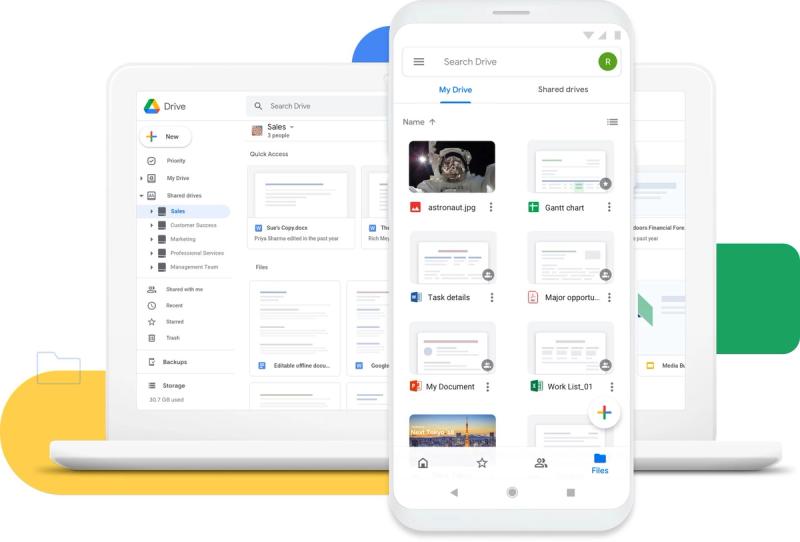
Source: Google Drive
✅ The pros:
- Easy to use
- Access on any device for on-the-move event day collaboration
- Compatible with various file types
- Secure back-up option
- 15GB of free storage
❌ The cons:
- Requires internet connection
- Download and upload speed can be slow
- No preview available for visual images
- Certain security risks
6. Gifting platforms - Create an unforgettable experience for attendees
Corporate gifting and swag platforms do more than simply pick, pack, and ship attendee gifts. With next-gen AI gifting tech, event marketers can personalize the gifting experience while easily tracking each item’s impact and return on investment (ROI). Consider gifting the promotional tool you didn’t know you needed!
The inside scoop on this tool: When it comes to gifting, personalization matters. Alyce nails it with excellent options for customizable gifts, while going the extra step to help measure the impact of every campaign.
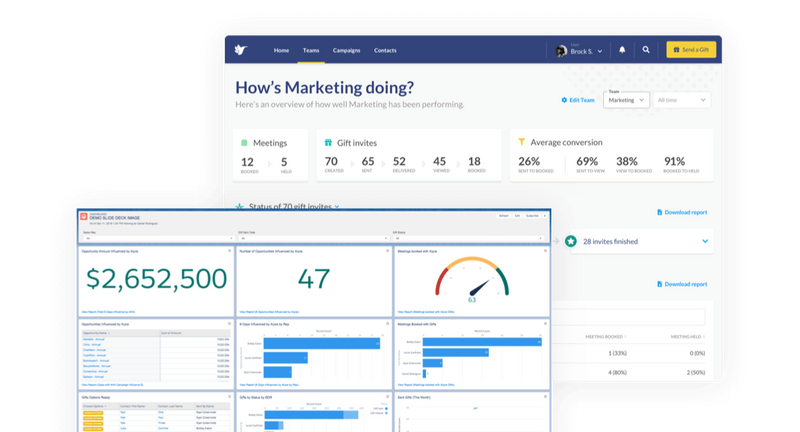
Source: Alyce
✅ The pros:
- Large gift selection
- Email and physical delivery methods make gifting accessible to both virtual and in-person attendees
- Easy-to-use Chrome extension and API integration
- Customizable email options to tie your gift back to your event
- Extensive analytics to track success
❌ The cons:
- No follow-up email option
The inside scoop on this tool: An all-in-one service for storing and shipping direct mail, company swag, and customer gifts to recipients worldwide while helping event marketers track ROI.
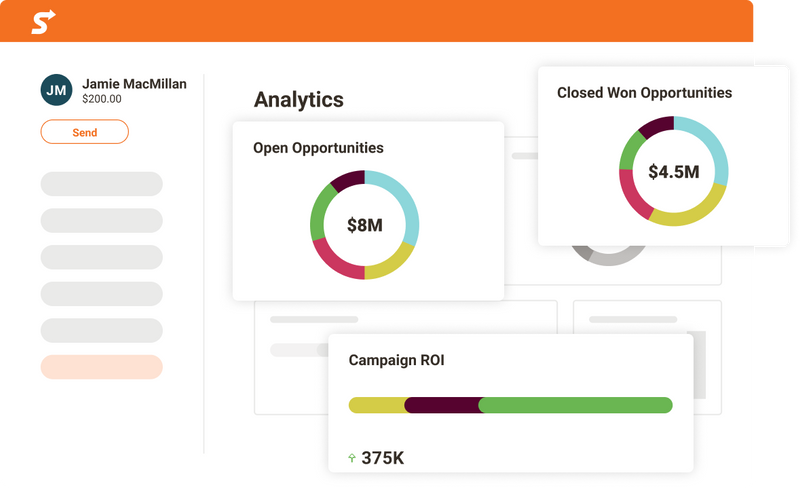
Source: Sendoso
✅ The pros:
- Great gifting catalog
- Ability to assign spend budgets to teams
- Salesforce and Marketo integrations for tracking gift responses
- Easy and fast to get started
- Offers end-to-end reporting throughout the sales funnel.
❌ The cons:
- Breadth of the catalog makes browsing tricky
- Pick and pack fees can get costly
The inside scoop on this tool: Gifting is great on its own, but if you’re looking to raise brand awareness while you gift, SwagUp is the perfect solution to storing and sending personalized swag.
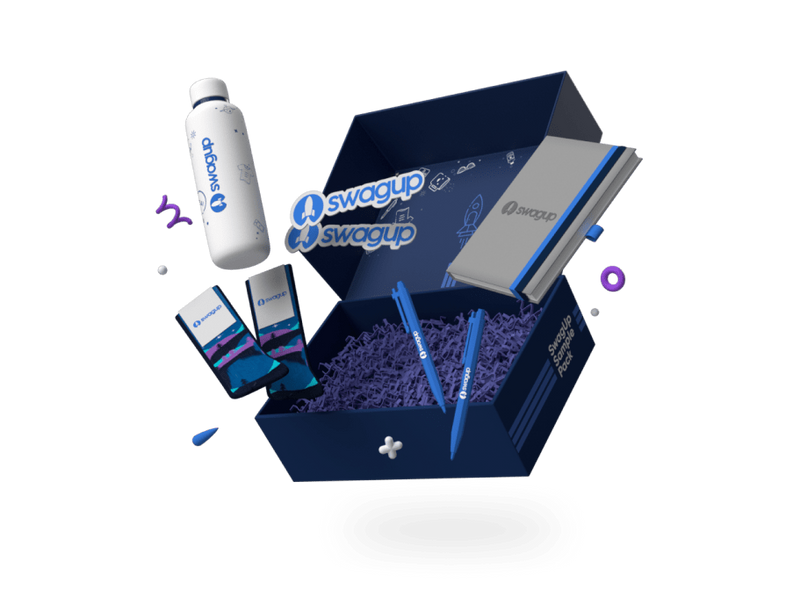
Source: SwagUp
✅ The pros:
- Pre-defined swag-packs available to customize
- Swag storage included
- Unforgettable unboxing experience
- Automation options to simplify the process
❌ The cons:
- Stockouts and shipping delays can happen
🎁 Elevate your gifting strategy with 15 Virtual Swag Bag Ideas guaranteed to wow your attendees!
7. Integration management and automation - Make sure your event marketing tools play nicely
Integration tools are the glue that holds your event marketing tech stack together. With the right tool, almost every other platform on this list can be connected, keeping your event running smoothly across various teams and systems.
The inside scoop on this tool: Connecting over 1,000 different apps together to automate every possible workflow, Zapier can save you time, money, and one major event day headache.
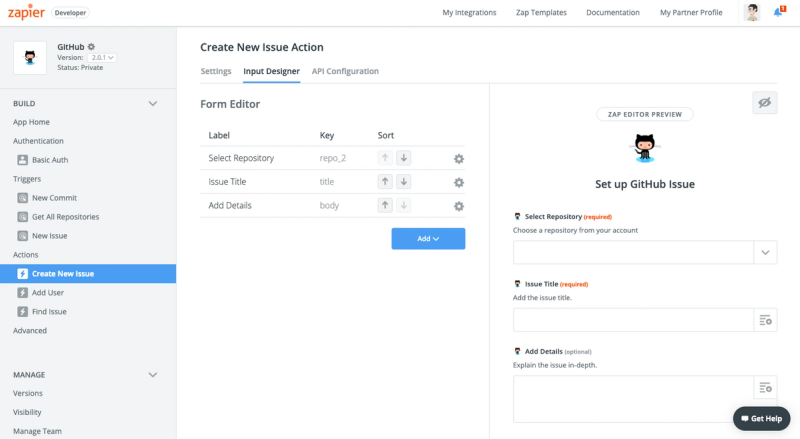
Source: Zapier
✅ The pros:
- Easy to configure
- Great range of reliable integrations
- Affordable and scalable
❌ The cons:
- Setup can be confusing at first
The inside scoop on this tool: Tray.io makes integration, automation, and innovation accessible to all. This handy tool allows event marketers to automate key workflows, freeing them up to focus on their event day responsibilities.
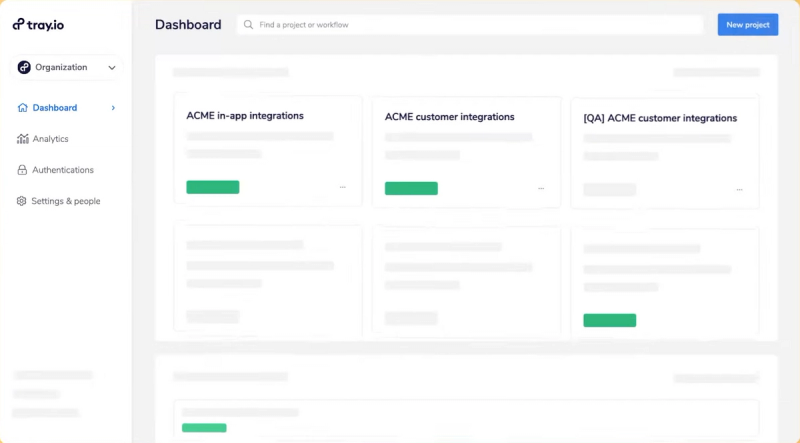
Source: Tray.io
✅ The pros:
- Easy to use
- Responsive support
- Advanced user interface that allows for customization
❌ The cons:
- Tricky to configure manually
- Minimal trigger options for certain workflows
8. Design tools - Make your event branding shine
Your event needs to pack a punch visually — from the in-event branding, promo materials, landing pages, event content, and so much more. If you don’t have the luxury of a full-time in-house designer, these tools are just the ticket.
Figma
The inside scoop on this tool: Figma is a tool that lets everyone — regardless of department — get in on the design process. With this simple, visual tool, every member of the event marketing team can explore, share, and provide feedback on event-related designs in real-time.
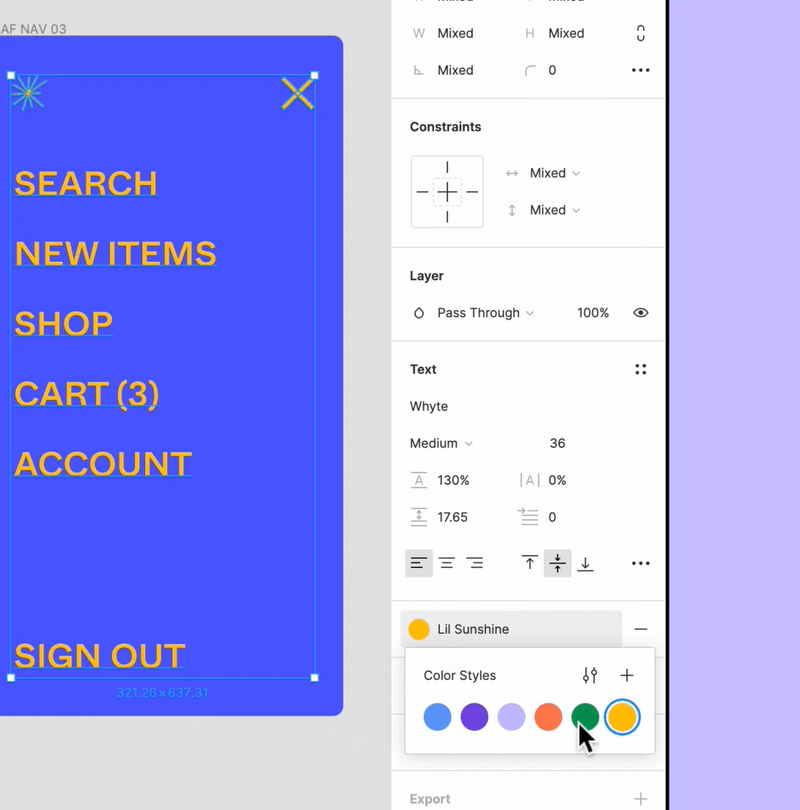
Source: Figma
✅ The pros:
- Easy to use and flexible
- Simple to share across teams
- Allows for real-time collaboration
- Intuitive import capabilities
- Plugins and widgets available for automation
❌ The cons:
- Limited image editing tools
- Doesn’t work offline
- Limited version control
The inside scoop on this tool: Canva makes it easy for anyone to create great content with customizable templates and access to a world of free-to-use images, videos, graphics, and audio files. Whether it’s a social media post, presentation, logo, or website banner, Canva’s got you covered.
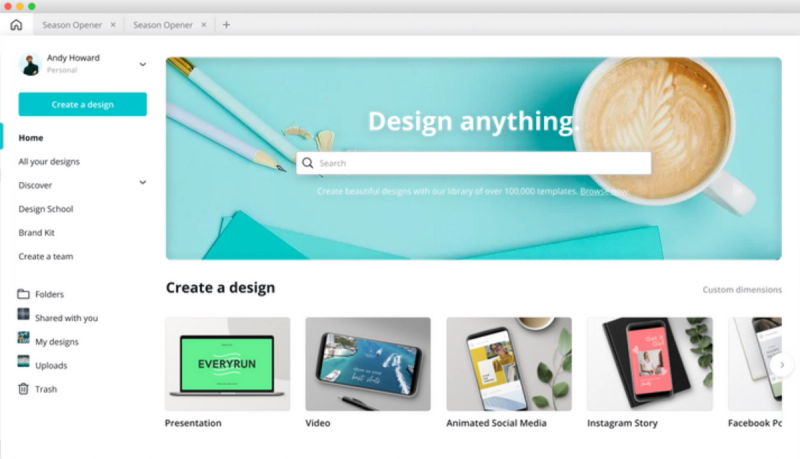
Source: Canva
✅ The pros:
- Great mobile app for content creation on-the-move
- Sharing and commenting makes event team collaboration easy
- Integrates well with other apps and tools
- Free version available
❌ The cons:
- Not entirely compatible with all operating systems and browsers
- Download quality can vary
- Search functionality could be more advanced
- Can’t be used offline
9. Analytics platforms - Measure your event success
No marketing strategy is complete without success metrics. For the modern event marketer, data is everything. The right analytics platform empowers event marketers to report their successes, improve on weaknesses, understand attendee behavior, and make informed decisions for future events.
The inside scoop on this tool: As one of the most trusted marketing analytics tools out there, Google Analytics is a no-brainer for thousands of event marketing teams. The tool collects website data and generates meaningful reports that can help deliver tangible insights on the attendee journey.
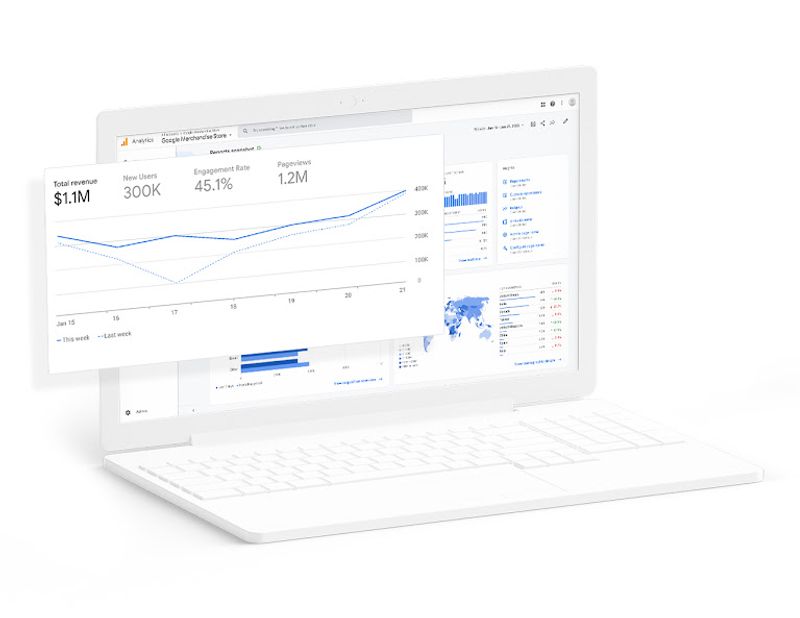
Source: Google Analytics
✅ The pros:
- Shows real-time traffic data
- Pre-made audience, acquisition, behavior, and conversion reports save time
- Tracks movements by web page to understand user behavior
- Totally free
❌ The cons:
- Data sampling can skew your results
- Customer support is minimal
Event marketing tools - chaos = One A+ event
If you were in construction, you wouldn’t turn up to work without your hardhat and boots. 👷🏽
The same goes for event marketers. Because while running an event without a CRM, MAP, or project management platform can be done, there’s a reason experts advise against it.
When you’re ready to unite your event marketing tools in one powerful event management tool, Goldcast is here to help.
As a purpose-built platform for B2B enterprises, Goldcast helps event marketers execute modern, meaningful, and measurable virtual and hybrid events. From custom branding, next-gen engagement tools, best-in-class event analytics, and more, Goldcast is here to help event marketers keep the stress low and ROI high

Transform Your Video Marketing with AI
Stay In Touch
Platform
Resources
© 2025 Copyright Goldcast, Inc. All rights reserved.





 Upcoming Events
Upcoming Events Event Series
Event Series On-Demand Events
On-Demand Events